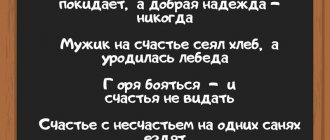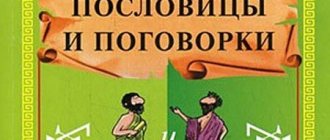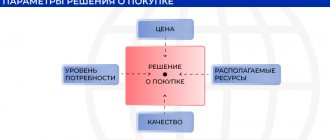Work and labor have always been held in high esteem by Russian people. Many proverbs and sayings about work have been invented on this topic. They ridicule laziness and idleness and glorify hard work and perseverance. A well-aimed word will help in business and will not let you sit too long on vacation.
In our selection of proverbs and sayings about work you will find both meaningful expressions and funny sayings that are understandable to both children and adults.
The work is bitter, but the bread is sweet
Proverbs and sayings about work
Who does not work shall not eat. Work until you sweat, and eat when you want. He who grinds bakes bread. The work is bitter, but the bread is sweet. The beekeeper is bitter, but his honey is sweet. Time for work, time for leisure. The work is hard if you put both of them together and you can do it easier. The work of the plow is visible in the furrow. If there was a desire, all work would improve. Garden work, but national glory. Work harder and you will be remembered longer. Lunch tastes better when the work is done. An earned loaf is better than a stolen loaf. Good people start their day with work. Think in the evening and do it in the morning. When life is fun, work goes smoothly. Work more boldly - you will live more fun. Don’t put off today’s work until tomorrow. If you get up early, you will work more. There is a job for a willing worker. He who works tirelessly cannot live without bread. He who has work has bread. He chops with two axes, but the work is no contest. Man is great at work. Work has begun - the day is short. Take on any job willingly. Finished the job - go for a walk safely. The master's work is afraid. Time for business - time for fun. A beloved job, like a beloved wife, will not become boring. Down and Out trouble started. Strike while the iron is hot. Work not out of fear, but out of conscience. Cut the tree at the shoulder. From work you will not be rich, but you will be hunchbacked. From the labors of the righteous you will not build stone chambers, but you will put your soul in hell, and so you will be rich. If you take up the tug, don’t say it’s not strong. Go to work quietly, run from work. Work loves praise. I don’t do anything and I don’t run around doing nothing. Work loves fun. Work saves money, but drowns wine. Work torments, feeds, and teaches. The work of the master is praised. The work is menial, but the money is white. Working children are their father's bread. Looking at someone else's work, you won't get enough. By work and pay, by product and price. They know the employee from the job. You work conscientiously, and you’re not ashamed to look people in the eye. Good work makes an old man look younger. Work more friendly - it will be more correct. Work what you are told to do, and eat what you are given. The guys work, and the foals eat. If you won’t work, you’ll stretch your legs from hunger. The worker gets half a ruble, the foreman a ruble. The worker has work, the owner has care. No work and the oven is cold. There is so much work that the chickens are not pecking. Hard working like a bee. The working man is the master of everything. Work drives out all nonsense.
Application of the phraseological unit “he who does not work, neither shall he eat”
- “I’m a non-working woman, Polish work makes my head spin... - Tell me how gentle you are! Then go for a walk, but you won’t get any bread. Here, “he who doesn’t work, doesn’t eat!” (Sholokhov “Virgin Soil Upturned”). - “In the untouched, shining snow stood the Passionate Monastery, silent, with a large red inscription: “He who does not work, does not eat” on the red squat walls” Kaverin “Illuminated Windows”). “ The order was this: for every liter milked, one hundred grams of flour. If a cow gives ten liters, you get a kilo... If you give fifteen, you get one and a half. This is how cow piecework was established: whoever doesn’t milk, doesn’t eat” (E. Nosov, “The Fifth Day of the Autumn Exhibition”). - “He who does not work must not eat” - this is the basic, primary and most important rule that the Soviets of Workers’ Deputies can and will introduce when they become power” (Lenin, “Will the Bolsheviks retain state power?”) - “Bourgeoisie breaks down fixed prices, speculates in grain, makes a hundred, two hundred and more rubles per pood of grain, destroys the grain monopoly and the correct distribution of grain, destroys with bribery, bribery, malicious support of everything that destroys the power of the workers, which seeks to implement the first, fundamental, radical principle socialism: “he who does not work, neither shall he eat” (Lenin “On Hunger (letter to St. Petersburg workers”)
A worker with a bipod, and a quitter with a spoon
Funny proverbs and sayings about work
He eats until he sweats, but works just to stay warm. If you don't want to sew with gold, hit with a hammer. The horses are dying from work. Better a belly from beer than a hump from work. Work loves a fool, but a fool is happy with work. If there was a neck, there would be a clamp. He waved the spoon - rest a little. Leave me alone, work. I'm sad... Those who get up early live far from work. A worker with a bipod, a slacker with a spoon. The nag is carrying water, the goat is shaking its beard - both are working. “We plowed,” said the fly, sitting on the horns of the ox. Work well and be proud of your pension. If you don’t know how to work with a mouse, you’ll have to work with a shovel. If you don't work, you have nothing to live on. If you work, you have no time to live! Work loves fools. Work is not a wolf - it won’t run away into the forest. The work is not a bear - you can see it tomorrow. Works without using your hands. If you want to work, work! And don’t disturb others’ sleep. Don't be afraid of me, work, I won't touch you! As you clap your hands, so I dance. Work, work, switch to Fedot, from Fedot to Yakov, from Yakov to everyone... Work ennobles a person and enriches the employer
Orthodox Life
The famous phrase was widely used in Soviet times. In fact, the principle she expresses is borrowed from the New Testament, or more precisely from the words of the Apostle Paul.
The famous phrase “he who doesn’t work, doesn’t eat” was widely used in Soviet times both in official politics and among the people. For example, this is the second principle of the Moral Code of the Builder of Communism: “Conscientious work for the good of society: he who does not work, does not eat.” And even earlier, this aphorism was included in the text of the first Soviet constitution of 1936, in its 12th article: “Work in the USSR is the duty and matter of honor of every citizen capable of work, according to the principle: “he who does not work, does not eat” ... "
In fact, this principle was borrowed by the communists from the New Testament, from the words of the Apostle Paul: “If anyone does not want to work, let him not eat” (2 Thessalonians 3:10). In his second letter to the Christian community of Thessalonica, the apostle exhorts Christians to stay away from those who act disorderly and not according to the tradition which you received from us (Thessalonians 3:6). He gives himself as an example that even he, God’s chosen apostle, feeds on the labor of his own hands: “For we did not riot among you, nor did we eat anyone’s bread for free, but we labored and labored night and day, so as not to burden any of you.” , - not because we do not have power, but to give ourselves to you as a model for us to follow. For when we were with you, we commanded you: if anyone does not want to work, he should not eat” (2 Thessalonians 3:7-10).
It would seem that the difference between the phrases “if someone doesn’t want to work, let him not eat” and “he who doesn’t work, don’t eat” is very insignificant. However, it is not. It is no coincidence that the word “does not want” was dropped from the communist aphorism. And what is meant by the Apostle Paul is very different from what V.I. Lenin wanted to say in his article “On Hunger” (1918), where this phrase was used for the first time in Soviet propaganda.
It was May 1918, the civil war was going on. Famine was raging, and city dwellers especially suffered from it. Lenin, examining the main question - the question of bread, says that while the workers are starving, nearby we see rampant speculation in grain, which was organized by the bourgeoisie and the kulaks. He argues that the state monopoly on the grain trade is being destroyed, and this “destroys the power of the workers, which is striving to implement the first, fundamental, radical principle of socialism: “he who does not work, neither shall he eat.” “He who does not work, neither shall he eat” - this is clear to every working person...” Lenin demands a ban on private trade in grain, as well as the strictest state accounting and control when confiscating “surplus grain” from peasants. He even calls this task truly communist, and its solution the threshold of socialism.
And here you can see a huge difference in the evangelical approach and Lenin’s. Among the communists, the phrase of the Apostle Paul has become an impersonal, categorical demand that does not take into account the inner disposition of a person, whether he wants to work or not, and even, paradoxically, whether he works or not. Now the state itself, which has become the only employer, determines who can be considered a working person and who cannot. That is, only those whom the state approves as labor units will receive wages from it and, therefore, eat.
Remember the legendary quote from the 1965 film “Operation Y and Shurik’s Other Adventures”: “Well, citizens are alcoholics, hooligans, parasites! Who wants to work today? In addition to her sparkling humor, she was also extremely relevant back then. At that time, an article for “parasitism” was introduced into the Criminal Code, and one of its first victims was the poet Joseph Brodsky, who was not a member of the state Writers’ Union and, therefore, could not be considered a poet. Since 1961, those who did not work for four months of the year were subject to criminal liability. Only housewives with children were allowed not to work. This article existed in the USSR for 30 years until its abolition in April 1991.
Returning to the Apostle Paul, naturally, his words do not deny private property and private initiative. They cannot be used as a cudgel to deal with those who go beyond the boundaries defined by the state. In this case, work is simply a means of maintaining your life, when you do not want to parasitize on others and live at their expense. So Lenin’s “he who does not work, neither shall he eat” became another example of the perverted perception of evangelical values that was characteristic of communism and Marxism.
Foma in Ukraine
Under a lying stone and water does not flow
Proverbs and sayings about work and laziness
What is the pay, so is the work. The lazy person sleeps while lying down and works. The work is not great, but laziness does not dictate. Work until dawn, but don’t waste your time. Work until you sweat, eat bread when you want. I'm not good at working, but I'm good at eating. Where they work, it’s dense, but in a lazy house, it’s empty. Healthy for food, but sick for work. Water does not flow under the lying deck. Eat - don't be ashamed, and work - don't be lazy. Work off the shoulders, and onto the stove. He who is lazy with his plow will have a bad year all year. Life is hard for those who run away from work. Work is not without care, but care lives without work. A lazy person doesn't like work. Lazy for work, zealous for lunch. I would drink and eat, but work wouldn’t come to my mind. People worked, and he traded air. Work saves strength, but laziness drowns it. The work turns moldy in her hands. It's a long day until the evening for those who have nothing to do. Labor feeds a person, but laziness spoils him. Work is with your teeth, and laziness is with your tongue. Where there is work, there is plenty, but in a lazy house it is empty. Dress up, don't rush, and work - don't be lazy.
Who does not work shall not eat
( Serbian folk tale ) King Matia had a beautiful daughter, but she was lazy: she never did anything, and she didn’t know how to do anything, she sat in front of the mirror every day and admired herself. The time has come to marry her off. The king announced: whoever teaches his daughter to work at the age of three will marry her to him. Time goes on and on, and no one wooes the princess. The king sent his entourage to look for a husband for his daughter. They went in different directions. And then one day they met a guy plowing a field with eight oxen. They immediately ordered him to go to the king. The guy was scared, but there was nothing to do. He comes to the king, and he told him everything in order. The guy agreed and promised to teach the girl to work at three years old. He brought the princess home. The mother ran out to meet her, marveling at the beautiful girl. The next day the guy took the plow, harnessed the oxen and went to the field, and told his mother not to force her daughter-in-law to work. In the evening I returned from work, the mother served dinner, and the son asked: “Who worked today, mother?” “Me and you,” she answers. - Well, whoever worked can eat. The royal daughter did not like this, she got angry and went to bed hungry. And the next day everything was the same. On the third day, the princess said to her mother-in-law: “Mom, give me some work too, so I don’t have to sit idle.” She told her to chop some wood. It was getting dark. We sat down to dinner, and the guy asked again: “Who worked today, mother?” - We are three: me, you and the princess. - Well, whoever worked can eat. And all three had dinner. So, little by little, the princess learned to work. Three years later, the king comes to visit his daughter. He sees that she is working together with her mother-in-law. He was delighted and said: “How, have you learned to work?” “But of course,” the princess answers, “it’s how it’s supposed to be with us: whoever worked can eat.” And you know, father, if you want to have dinner, go chop some wood. The king brought his daughter and son-in-law many gifts, stayed for a while, and then took all three to his palace. He accepted that guy as his own son, and promised to transfer the kingdom to him during his lifetime.










